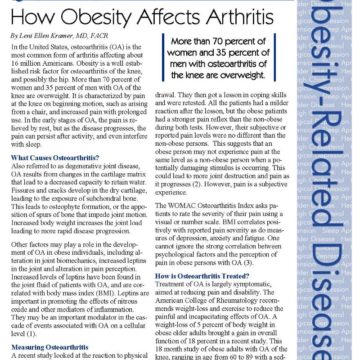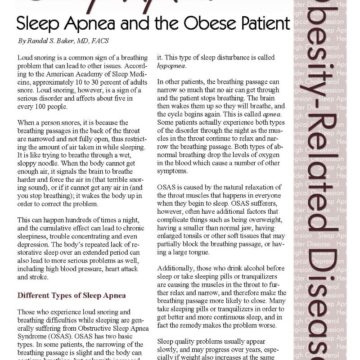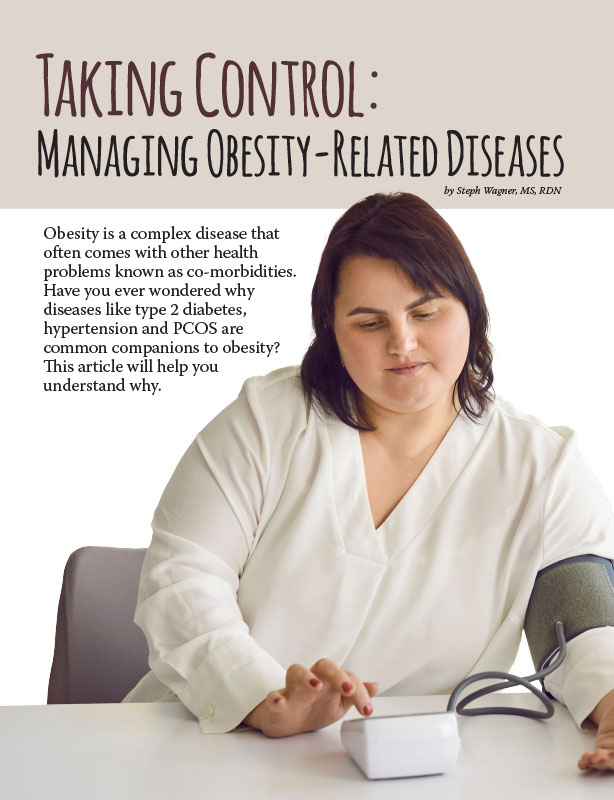Cardiovascular Disease – Obesity and the Heart

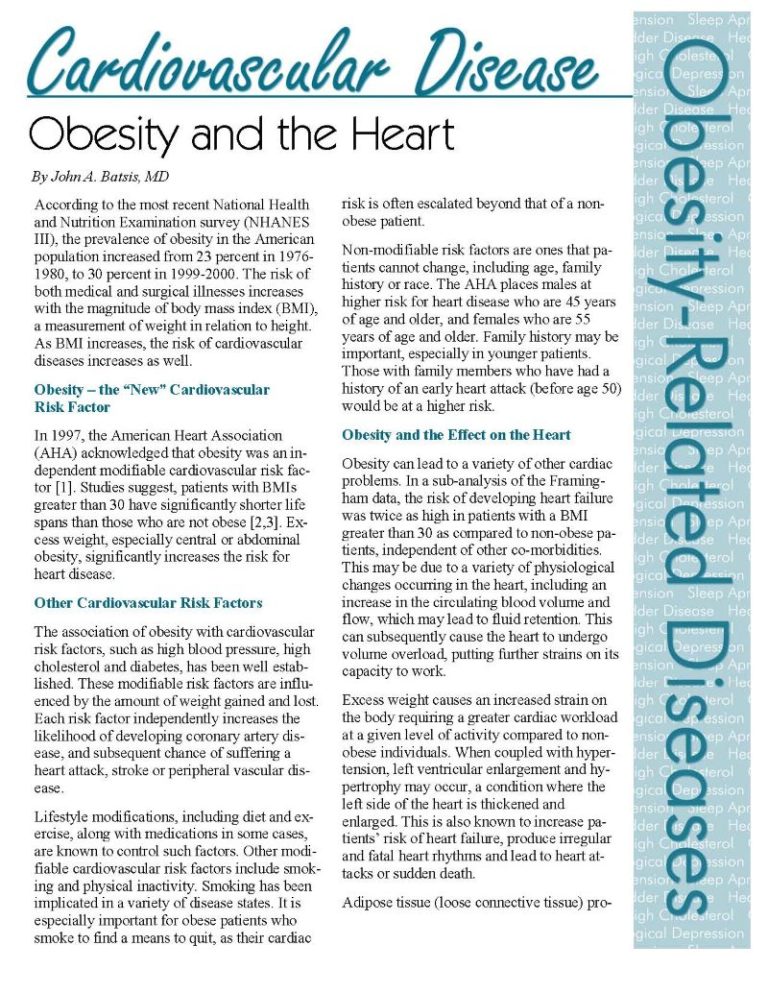
by John A. Batsis, MD
Summer 2006
According to the most recent National Health and Nutrition Examination survey (NHANES III), the prevalence of obesity in the American population increased from 23 percent in 1976-1980, to 30 percent in 1999-2000. The risk of both medical and surgical illnesses increases with the magnitude of body mass index (BMI), a measurement of weight in relation to height. As BMI increases, the risk of cardiovascular diseases increases as well. 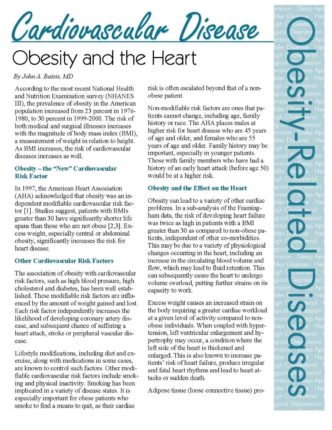
Obesity – the “New” Cardiovascular Risk Factor
In 1997, the American Heart Association (AHA) acknowledged that obesity was an independent modifiable cardiovascular risk factor [1]. Studies suggest, patients with BMIs greater than 30 have significantly shorter life spans than those who are not affected by obesity [2,3]. Excess weight, especially central or abdominal obesity, significantly increases the risk for heart disease.
Other Cardiovascular Risk Factors
The association of obesity with cardiovascular risk factors, such as high blood pressure, high cholesterol and diabetes, has been well established. These modifiable risk factors are influenced by the amount of weight gained and lost. Each risk factor independently increases the likelihood of developing coronary artery disease, and subsequent chance of suffering a heart attack, stroke or peripheral vascular disease.
Lifestyle modifications, including diet and exercise, along with medications in some cases, are known to control such factors. Other modifiable cardiovascular risk factors include smoking and physical inactivity. Smoking has been implicated in a variety of disease states. It is especially important for patients affected by obesity who smoke to find a means to quit, as their cardiac risk is often escalated beyond that of a non-patient with obesity.
Non-modifiable risk factors are ones that patients cannot change, including age, family history or race. The AHA places males at higher risk for heart disease who are 45 years of age and older, and females who are 55 years of age and older. Family history may be important, especially in younger patients. Those with family members who have had a history of an early heart attack (before age 50) would be at a higher risk.
Obesity and the Effect on the Heart
Obesity can lead to a variety of other cardiac problems. In a sub-analysis of the Framingham data, the risk of developing heart failure was twice as high in patients with a BMI greater than 30 as compared to non-patients with obesity, independent of other co-morbidities. This may be due to a variety of physiological changes occurring in the heart, including an increase in the circulating blood volume and flow, which may lead to fluid retention. This can subsequently cause the heart to undergo volume overload, putting further strains on its capacity to work.
Excess weight causes an increased strain on the body requiring a greater cardiac workload at a given level of activity compared to non-individuals with obesity. When coupled with hypertension, left ventricular enlargement and hypertrophy may occur, a condition where the left side of the heart is thickened and enlarged. This is also known to increase patients’ risk of heart failure, produce irregular and fatal heart rhythms and lead to heart attacks or sudden death.
Adipose tissue (loose connective tissue) promotes the development of atherosclerosis. This is a hardening of the arteries believed to be an inflammatory disorder. Leptin is a hormone produced from excessive adipose tissue and “turns-on” inflammatory systems, accelerating coronary atherosclerosis, and inducing insulin resistance. This process can damage heart cells, inevitably leading to replacement of healthy heart cells by fatty cells. The implications of this are profound, leading to deadly rhythm disturbances.
Another well documented complication of obesity is sleep apnea. Symptoms include a complaint of daytime sleepiness, snoring at night and instances where patients may “stop” breathing. This disease has significant consequences to the heart and places patients at higher risk for heart failure, high blood pressure and sudden rhythm disturbances.
Bariatric Surgery and Cardiovascular Risk
The American College of Cardiology (ACC) and AHA have outlined that weight-loss is of paramount importance in the prevention of heart disease, but also in those who have suffered a cardiac event. Bariatric surgery is known to induce a profound weight-loss, which itself will lead to decreased resting metabolic demand and blood volume. As such, blood pressure is likely to fall, and the work exerted by the heart is likely to be reduced. Weight-loss can reduce the progression of left ventricular hypertrophy and size, and perhaps even promote its regression.
Most studies examining outcomes of weight-loss surgeries concentrate on surgical outcomes and very few examine the observed changes in cardiovascular risk factors. The largest prospective study, the Swedish Obesity Study (SOS), has shown significant improvements in hypertension, hyperlipidemia and diabetes amongst patients treated with gastric banding procedures or biliopancreatic diversion. Our group has recently presented results showing significant improvements of weight, blood pressure, lipid profiles and diabetes, with a decreased usage of medications, in patients with obesity treated with a Roux-en-Y procedure, compared to patients managed in a traditional weight-reduction program. Although follow-up lasted approximately three and a half years, further follow-up is required to better characterize the stability of the improvement of such factors [6].
Even in patients with pre-existing heart disease, bariatric surgery has been shown to be a relatively safe and effective procedure. In a study published by our group in 2005, there were no differences in mortality or cardiac events between patients who were classified as having coronary artery disease (CAD) and those who were free of CAD [7]. This has profound implications for patients with obesity, who are inherently at a higher pre-operative risk to begin with, who may in turn have been candidates for bariatric surgery but may have not been identified early enough. There is very little long-term data examining the outcomes of bariatric surgery on patients with pre-existing heart disease.
With reduction in cardiovascular risk factors, one would expect improvements of cardiovascular risk; however, there is no data presently examining prospective cardiovascular events in patients who have undergone surgery. Further data is still needed prior to concluding that bariatric surgery would definitively improve long-term cardiovascular outcomes.
Benefits of Weight-loss on Cardiovascular Health
There have been a multitude of studies that have determined that weight-loss can provide a beneficial effect on a number of cardiovascular risk factors.
Although there is little if any literature available which demonstrates that voluntary weight-loss affects total mortality or cardiovascular disease, control of such variables will have beneficial effects on long-term outcomes.
Behavioral modification in the form of diet and exercise is required in all patients with obesity. Dietary modification leading to weight reduction has been well established in reducing the LDL (bad cholesterol), with related increases in HDL (good cholesterol). Furthermore, weight-loss can be sustained by regular exercise.
Small degrees of weight-loss of five to 10 percent have remarkable effects on lowering blood pressure improving lipid profiles. Substantial weight-loss is known to improve insulin sensitivity and leads to improvement in diabetes.
Conclusions
There appears to be an explosion of clinical research in examining the outcomes following bariatric surgery in the past few years. It is well established that patients with obesity are at significantly higher risk for heart disease and will inevitably have a shorter life expectancy than non- individuals with obesity. Studies have shown that medication costs, outpatient and hospital visits are higher in those with a higher BMI. This has profound implications on our society as a whole. Current estimates predict that obesity accounts for roughly $140 billion /year.
In patients who meet appropriate criteria, bariatric surgery leads to sustained long-term weight reduction, with improvements in the management of high blood pressure, diabetes and high cholesterol. These near-resolutions in patients’ cardiovascular risk factors are likely to result in a significant reduction in patients’ predicted cardiac risk, with a decline in healthcare utilization. However, prospective long-term studies examining the Roux-en-Y procedure are needed to determine if resolution of such factors persist and whether the number of cardiac events and deaths actually correspond to those projected in risk-estimates.
About the Author:
John A. Batsis, MD, is a researcher at the Mayo Clinic in Rochester, Minnesota.
References:
– Eckel R. Obesity and Heart Disease: a statement for healthcare professionals from the Nutrition Committee, American Heart Association. Circulation 1997;96:3248-50
– Peeters A, Barendregt J, Willekens F, et al. Obesity in adulthood and its consequences for life expectancy: a life-table analysis. Ann Intern Med 2003;138:24-32
– Yan L, Daviglus M, Liu K, et al. Midlife Body Mass Index and Hospitalization and Mortality in Older Age. JAMA 2006;295:190-198
– Consensus Development Conference Panel. NIH conference: gastrointestinal surgery for severe obesity. Ann Intern Med 1991;115:956-961
– Sjostrom L, Lindroos A-K, Peltonen M. Lifestyle, Diabetes, and Cardiovascular Risk Factors 10 years after Bariatric Surgery. NEJM 2004;351:2683-2693
– Batsis JA, A. Romero-Corral, ML Collazo-Clavell, MG Sarr, V Somers, L Brekke, F. Lopez-Jimenez. Effect of Bariatric Surgery on Cardiovascular Risk Factors and Predicted Effect on Cardiovascular Events and Mortality in Class II-III Obesity. J Am Coll Card 2006 Feb;47(4) (Suppl 1): 358A
– Lopez-Jimenez F, Bhatia S, Collazo-Clavell M, Sarr M, Somers V. Safety and efficacy of bariatric surgery in patients with coronary artery disease. Mayo Clin Proceedings 2005;80:1157-62
by Steph Wagner, MS, RDN Spring 2024 Obesity is a complex disease that often comes with other…
Read Articleby Katherine H. Saunders, MD, DABOM Spring 2024 Menopause probably isn’t anyone’s idea of fun. While this…
Read Articleby Sarah Ro, MD; and Young Whang, MD, PhD Fall 2023 Mary, a postmenopausal woman with a…
Read Article




